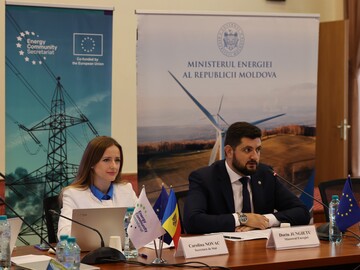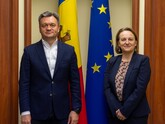
Moldova needs EUR 43 billion in investments to implement Energy Strategy until 2050 - Ministry of Energy
This was discussed during the presentation of the draft Energy Strategy until 2050 by the Ministry of Energy at a public event with the participation of key players in this field from the public and private sectors, civil society and development partners. As noted, the Energy Strategy of Moldova until 2050 aims to ensure the transition to a secure, sustainable, efficient and competitive energy system. The draft strategy introduces a number of important new elements that distinguish this vision from previous strategies. According to the document, the share of electricity produced from carbon-free sources should reach 85% of the total local production by 2050, and about 90% of national electricity needs will be met by domestic renewable sources - solar, wind, biomass and high-efficiency cogeneration. The strategy envisages the adaptation of the legal and institutional framework to modern European requirements by gradually aligning national targets related to the development of the energy sector with the provisions of the Fit for 55 and REPowerEU legislative packages. At the same time, the strategy contributes to the mobilisation of European funding and the attraction of private investment by creating a fund for the energy renovation of buildings and implementing the SuperESCO model to improve energy efficiency in the public sector. The introduction of sustainability and innovation criteria in public procurement is intended to stimulate the adoption of clean technologies and support for the green economy. To achieve the goals of the strategy by 2050, a total investment of approximately €43 billion is needed, distributed as follows: €8.5 billion for new capacities for the production of electricity from renewable sources; €9.1 billion for the renovation of buildings and the transition to sustainable electric heating; €5.5 billion for the decarbonisation and modernisation of district heating; €17.5 billion for the electrification and green infrastructure of the transport sector; the rest of the funds for energy efficiency, digitalisation, hydrogen, energy storage, and research and development. All these action lines are accompanied by concrete decisions based on long-term modelled energy scenarios, the results of consultations with relevant experts and actors, and lessons learned from the European integration of other countries. Achieving the proposed targets is expected to result in savings of more than €4 billion due to reduced natural gas consumption, a 30% reduction in operating and maintenance costs, and annual savings estimated at €355 million in 2030 and more than €1 billion in 2050. Herewith, economic modelling shows that the energy transition and the implementation of the strategy will contribute to an additional annual GDP growth of around 2%. “The importance of energy for all of us lies in the value it creates for consumers – light, heat, the ability to cook a family dinner or have access to the Internet and communicate with loved ones. Energy infrastructure requires significant investment, so it must be considered in the long term, taking into account the development of the entire economy and the sectors that consume the most energy, the needs of the population and various external factors that may affect the system. Such work has been carried out over the past 3 years with the support of the Energy Community Secretariat,” said Energy Minister Dorin Junghietu. Opening the event to present the draft Energy Strategy until 2050, Director of the Energy Community Secretariat Artur Lorkowski said that the Energy Strategy 2050 ensures the energy future of Moldova, being a European strategy in spirit and content. He emphasized that the strategy puts efficiency first, turns clean energy into an engine for development and guarantees the well-being of citizens through a fair and inclusive transition. Meanwhile, Artur Lorkowski noted that Moldova is strengthening its role as a party to the Energy Community Treaty and accelerating its path as a candidate country to the European Union. The draft of the new Energy Strategy of Moldova states that by 2050, 35-40 thousand new jobs will be created in areas such as renewable energy sources, energy efficiency, network services, digitalization, research and development. // 12.09.2025 — InfoMarket







